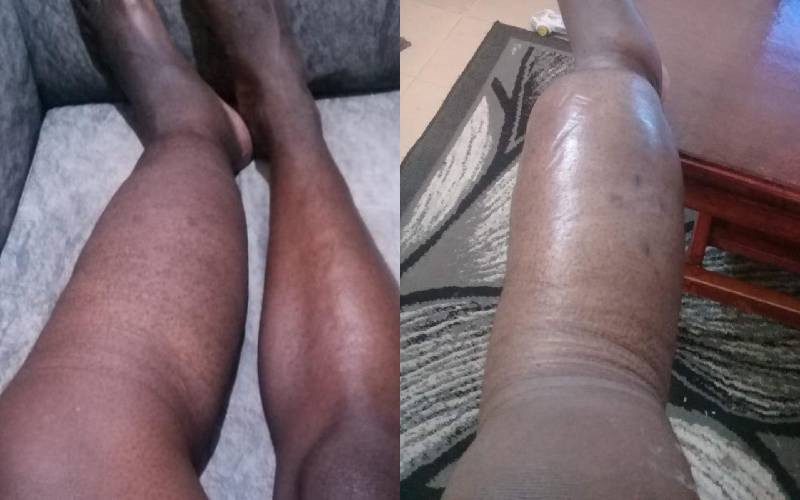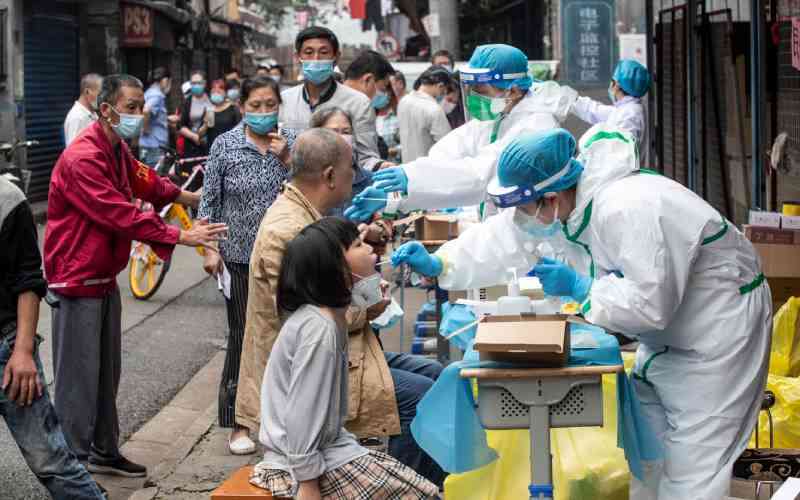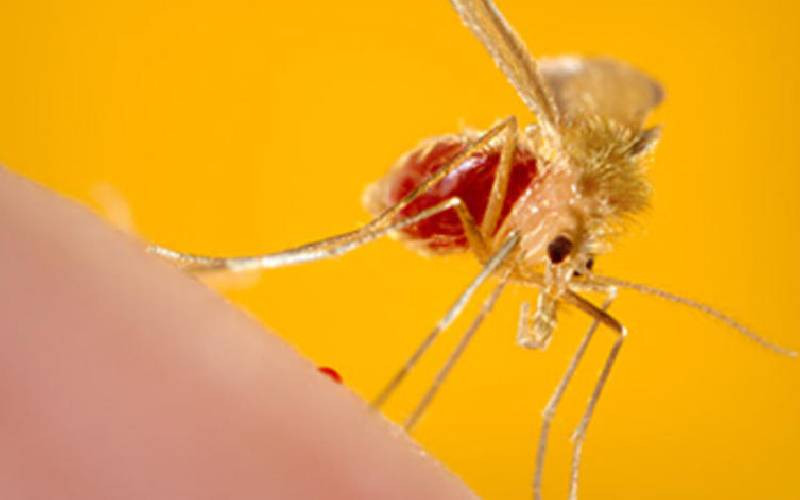
Fifteen years ago, Francis Komu’s life took an unexpected turn on what seemed like an ordinary evening. Standing at a matatu stage after a long day’s work, the then 22-year-old felt a sharp, needle-like pain in his ankle. At first, he brushed it off, scratching the irritating itch until it subsided.
But later, as he prepared for a shower, he noticed something alarming: bloodstains on his knee and his nails, signs that his scratching had broken the skin. Assuming it was a simple allergic reaction, he slept it off. The next day, a doctor recommended a tetanus shot, but weeks passed, and the discomfort persisted.
As a businessman relying on his work to make ends meet, Francis didn’t let the situation stop him. He continued with his usual routine, but over time, his leg swelled from his hip to his ankle and foot.
“That’s when I knew something was seriously wrong. I decided to visit a health facility to find out what had attacked me so quickly. When the medics saw me, they realised I was really sick. I explained everything, from the matatu incident to the swelling, and underwent numerous tests. Many doctors suspected problems with my pancreas, heart, or kidneys, but all tests came back negative,” he recalls.
READ: Rare condition: KCSE candidate with swollen legs suffers lymphoedema
“I spent a lot on tests, but eventually, through a scan, I was diagnosed with chronic Lymphedema. At the time, I didn’t know much about the condition, but after the medics explained, I recognised it. I had seen people with it on TV, and I knew I was one of its victims. So, what next after the diagnosis? The medics told me the solution was surgery, which is both expensive and extensive.”
Signs and symptoms
According to Dr Mufaddal Shokat, Resident Physician, The Nairobi West Hospital, Lymphedema is a chronic condition characterized by the accumulation of lymphatic fluid in the tissues, leading to swelling, most commonly in the arms and legs. It occurs when the lymphatic system is compromised, preventing lymph fluid from properly draining.
“Signs and symptoms that accompany this condition ranges from, swelling - this typically occurs in the arms, legs, or other parts of the body.
Initially, it may be soft and pitting, but over time, it can become hard and fibrotic. There will be a sensation of fullness or heaviness in the affected limb. Changes in the skin such as thickening, hardening, or the development of a dimpled (orange peel) appearance, known as pea orange and limited range of motion in the affected limb,” Dr Shokat explains.
According to Dr Shokat, Lymphedema is caused by abnormalities or damage to the lymphatic system and can be classified into two types: primary and secondary lymphedema.
“Primary lymphedema is a rare genetic condition where the lymphatic system fails to develop properly. This can manifest at birth, during puberty, or later in adulthood. The underdevelopment or malfunction of lymphatic vessels or nodes hampers the body’s ability to drain lymphatic fluid effectively, leading to swelling.”
“Secondary lymphedema, which is more common, results from external factors that damage the lymphatic system. Surgical procedures, especially those involving the removal or damage of lymph nodes, are a significant cause. Radiation therapy, often used in cancer treatment, can also harm lymphatic vessels.
Infections like cellulitis may obstruct lymphatic pathways, causing fluid buildup. Additionally, trauma or injuries to the lymphatic system can disrupt its normal functioning, leading to lymphedema. Understanding these causes is essential for early diagnosis, prevention, and effective management of this condition.”
“Precise statistical data regarding rare conditions can be difficult to obtain, but estimates suggest that approximately 7-8 per cent of the population may be affected by rare diseases globally. In Kenya, the lack of comprehensive healthcare data complicates the understanding of the prevalence of these conditions.”
He also had the option of pursuing medical treatment, which would only help maintain the condition, but he was nearly overwhelmed upon learning that there is no proven cure. “I realised there was no point in stressing myself. I accepted the condition and decided to focus on managing it.”
Rather than feeling a sense of relief, Francis returned home and found it increasingly difficult to avoid stress and depression.
“My leg had swollen and felt like a trunk, extending from my hip to my foot. It was heavy, painful, itchy and disturbing. The swelling eventually spread to my stomach. I explained everything to my family, and they offered their support. A few friends were there for me, but others disappeared.”
This condition is medically rare and expensive, so Francis had to reach out to friends, relatives, and family for financial support to manage his condition, which began in 2016. With some financial assistance, he was able to maintain his treatment, but doctors repeatedly advised him to pay serious attention to his Lymphedema disorder, as it could become problematic if left untreated.
“I’ve been living with this condition for 15 years now, enduring so much that it brings tears to my eyes whenever I think about it. I was surrounded by a loving family, including friends and relatives but many of them distanced themselves and started spreading stigma. Some claimed it was linked to witchcraft, saying I had stepped into something wrong or had been bewitched, but that wasn’t the case. It’s a condition anyone can develop, anywhere, at any time, and it has nothing to do with such beliefs.”
“It is essential to educate communities that lymphedema is a medical condition, caused by physiological factors, not something supernatural. Raising awareness through public health education can help dispel these myths and foster understanding,” explains Dr Shokat.
Undergo surgery
According to Francis, since 2010, he has visited numerous hospitals and consulted various doctors in an attempt to manage the disorder, but to this day, it remains a burden. “I’ve been advised to undergo surgery, which costs Sh2.1 million, an amount I can’t afford. However, I’m hopeful things will improve. Currently, I undergo fluid drainage in my leg to relieve the pressure, but this is only a management solution, not a cure.”
“The condition is a threat, and everyone should be aware of it. I’ve been through a lot; I had a wife who left me because of this condition. I tried again with someone else, but that didn’t work either. I guess they saw it as a burden – managing it isn’t easy. I can’t walk long distances, sit for extended periods, and I’m limited to certain jobs. Even good-paying jobs can be difficult, as any pressure on my leg causes fluid retention, leading to backaches and joint pain.”
Despite the challenges he faces, Francis remains optimistic. He no longer stresses about his condition and continues his business in Kiambu county, hopeful that one day, he will be cured.
ALSO READ: Your feet just won't fit in your usual shoes? Could be edema
“I never ask for help; I’m a very hardworking man. No matter how much I’m struggling, I refuse to lower myself, even when I feel like a monster is attacking me every day. To manage, I wear baggy trousers to avoid sympathy from others. I also wear compression stockings and take supplements to boost my immunity, as this condition makes me prone to other illnesses.”
“To others living with this condition, please don’t give up. Avoid alcohol, steer clear of strenuous work that puts pressure on your legs, and most importantly, don’t forget God. Let Him be close to you. Accepting the condition is key.”
“Many patients, like Francis, live with the condition for years by adopting comprehensive strategies, such as compression therapy to reduce swelling. Specialized massage techniques can help promote lymphatic flow, and gentle movements stimulate drainage,” says Dr Shokat.
Dr Shokat advises patients with lymphedema to consult a specialist. “Coordination with healthcare providers who specialise in lymphatic disorders, such as vascular surgeons, is essential.
Following prescribed compression and physical therapy regimens consistently is also important. Maintaining a healthy weight reduces stress on the lymphatic system, and good skin care is crucial to prevent infections, which can worsen lymphedema.”
“Although the government has made strides in improving healthcare access, it is often criticised for not adequately addressing rare conditions like lymphedema. Challenges include limited resources, lack of awareness, and insufficient training for healthcare providers.
Advocacy for more targeted public health initiatives, increased funding for rare diseases, and better training for healthcare professionals is vital to improving care for people with lymphedema and other rare conditions,” explains Dr Shokat.
“For better health outcomes, collaboration among medical professionals, government agencies, and community leaders is essential in tackling lymphedema and other rare conditions in Kenya,” he adds.
 The Standard Group Plc is a multi-media organization with investments in media platforms spanning newspaper print
operations, television, radio broadcasting, digital and online services. The Standard Group is recognized as a
leading multi-media house in Kenya with a key influence in matters of national and international interest.
The Standard Group Plc is a multi-media organization with investments in media platforms spanning newspaper print
operations, television, radio broadcasting, digital and online services. The Standard Group is recognized as a
leading multi-media house in Kenya with a key influence in matters of national and international interest.











